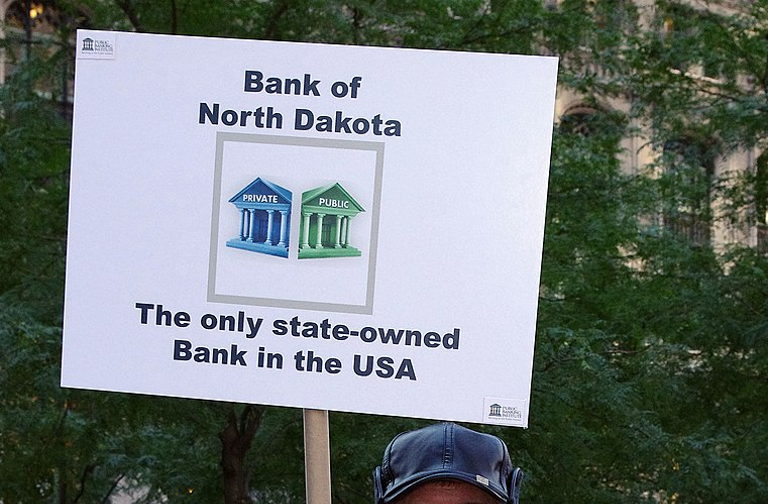In the classic movie It’s A Wonderful Life, a small community savings bank, a building and loan association which is dedicated to serving people in the community seeking to purchase a home, is nearly financially destroyed by the jealous owner of a corporate, commercial bank. Fortunately, at the end of the movie, neighbors, and townspeople join together in a form of financial “people power,” combining their resources in order to save the “People’s Bank.”
Unfortunately, life does not always imitate art. Today, small neighborhood community savings banks, savings and loan associations, and mutual savings banks are being swallowed up by corporate competitors at an increasing pace. Perhaps the biggest obstacle to achieving social and economic justice for all is the lack of financial resources available to those with the greatest need. This is especially true when it comes to commercial and corporate banking, where the greatest allocation of funds goes to those who already own a hugely disproportionate share of the nation’s wealth.
With all the obstacles to public banking, a small but significant step was taken in Philadelphia last March. The Philadelphia City Council, with one exception, voted unanimously to establish the Philadelphia Public Finance Authority. Its purpose is to provide credit lines for making loans to help small businesses unable to obtain regular loans from private financial institutions. Many of these enterprises are started by those without access to capital—usually working-class people and people of color.
Although not a bank in the traditional sense (the Authority is unable to take deposits from private sources), it can utilize the city’s financial resources to facilitate loans that benefit the community and help stimulate the local economy.
The Finance Authority will operate in partnership with private financial institutions. Private lenders will take applications from qualified small businesses, originating loans which will be guaranteed by letters of credit from the Finance Authority. Providing additional capital to small businesses will enable them to expand and hire additional workers. Given a multiplier effect, the additional cash resources available to small business employees will help circulate more money into the city’s economy.
Current state law does not allow for public institutions to receive deposits and originate private loans. Yet, there is nothing to prevent the Finance Authority from issuing letters of credit on behalf of small business borrowers to guarantee their loans from private lenders. This should stimulate originating loans to qualified small businesses, thus putting more money into the local economy.
The long-term goal for the Finance Authority is to work with the city in establishing a separate facility to receive city deposits and originate loans to local businesses as a commercial bank would. This might need state approval, which is doubtful, but the city can proceed with establishing such an entity, and then let the courts decide what the city can and cannot do.
Until then, the mayor of Philadelphia will appoint a board of nine members, serving six-year terms, to oversee the general operations of the Finance Authority. Once established, this Board of Directors will create an executive committee to coordinate the daily functions and activities of the facility. The executive committee will be composed of a CEO and other officers with valuable experience in finance, capital markets, and banking, as well as academic training, but they will also reflect the diversity and needs of the surrounding community.
The next step for the city in establishing a public financial institution would be to allocate funds in its next budget to enable issuing letters of credit for private banks to guarantee loans for qualified businesses. After those resources are provided for in the budget, the mayor will then need to officially start operations by appointing the board. City officials, activists, and other supporters of public finance are very hopeful that the Finance Authority will be fully operational by the end of the year.
Unfortunately, the current Mayor of Philadelphia, Jim Kenney, has so far not taken the steps necessary to implement the new law. Part of the problem is that Philadelphia’s finances are controlled by state officials, part of a deal between the city and state to provide state aid to Philadelphia necessary for that city to avoid default on its debts and possible bankruptcy. However, there is hope that a new Mayor to be elected later this year will use whatever authority they have at their disposal to make sure the Finance Authority begins operations to provide loans intended to benefit the community it serves.
It is almost certain that whoever wins the Democratic primary for Mayor, which takes place in June, will be elected in the general election this November. The good news is that every Democrat running for Mayor either voted last year in City Council to create the Finance Authority in City, or they have publicly committed themselves to support its implementation. The leading contender in the race is Helen Gym, a member of City Council who voted for the Finance Authority and who has pledged to do whatever it takes for putting the law into effect. She has been endorsed for Mayor by the Philly Neighborhood Networks Association, which is the leading progressive organization in the city.
There are several other organizations in Philadelphia lobbying to implement the provisions of the new public finance law. Among them is the Philadelphia Public Banking Coalition and the Philadelphia Area Cooperative Alliance. These groups recognize that a public bank for Philadelphia will aid and assist small businesses and organizations serving disadvantaged communities that traditionally have been restricted from getting access to loans and other sources of financing. The Cooperative Alliance also supports a public bank which would specifically target cooperative businesses and groups that are organized based on the principles of democratic ownership and self-management.
In the meantime, other states and municipalities are pushing forward with their own projects for state and local public banks. The Bank Of North Dakota, a public bank owned by the state for nearly a century, has been extremely successful over the years in providing significant financial aid and resources to underprivileged residents of that state who would otherwise have no access to financial services for their benefit.
In New Jersey, Gov. Phil Murphy proposed a state-owned bank that would use state deposits for loans and subsidies to various projects and businesses supporting community and economic development. Also California has passed a law enabling counties and municipalities in that state to establish their own publicly-owned banks, while other states, like New York, have introduced various bills to facilitate public banking.
It is very unlikely legislative proposals for public and state-owned banks will move forward in the near future. Until then, the Philadelphia approach seems to have the best chance of putting a mechanism in place to help community businesses and residents access the financial support they otherwise would not have.
The quickest way for this concept to expand would be for the Philadelphia Public Finance Authority to affiliate with smaller, community-based financial institutions such as credit unions, financial cooperatives, savings and loans, and mutual savings banks. Anything that would give borrowers an alternative to commercial and corporate banking would be an improvement. From It’s A Wonderful Life, we can see the advantages of community and cooperative banking where the people, and not corporate bosses, are in charge.
Teaser photo credit: By David Shankbone – Own work, CC BY 3.0, https://commons.wikimedia.org/w/index.php?curid=16901662





